‘Rustin’ champions the power of determination
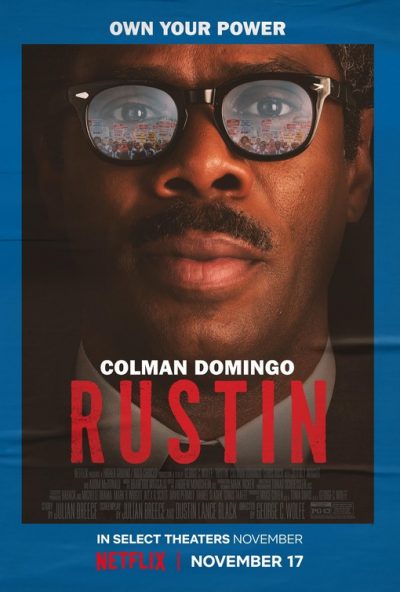
“Rustin” (2023). Cast: Colman Domingo, Chris Rock, Glynn Turman, Aml Ameen, Johnny Ramey, CCH Pounder, Jeffrey Wright, Gus Halper, Michael Potts, Maxwell Whittington-Cooper, Da’Vine Joy Randolph, Adrienne Warren, Audra McDonald, Lilli Kay, Jordan-Amanda Hall, Carra Patterson, Rashad Demond Edwards. Director: George C. Wolfe. Screenplay: Julian Breece and Dustin Lance Black. Story: Julian Breece. Web site. Trailer.
As the film opens in 1960, Bayard Rustin (1912-1987) (Colman Domingo) has developed quite a reputation for getting things done. The often-outspoken civil rights activist spent years working on various initiatives, and, in 1956, he became a trusted aide and advisor to Dr. Martin Luther King Jr. (Amil Ameen), who was emerging as the preeminent leader of the movement. In particular, Rustin taught King about the nonviolent resistance tactics developed by Mahatma Gandhi, a strategy that would come to define King’s subsequent protest efforts. Rustin also worked with King in establishing the Southern Christian Leadership Conference (SCLC) in 1957, one of the most highly visible organizations involved in the civil rights movement.
For the upcoming 1960 Democratic National Convention in Los Angeles, Rustin and King began work on plans for a civil rights march in conjunction with the event. However, influential Black leaders at the time – most notably Rep. Adam Clayton Powell Jr. (D-NY) (Jeffrey Wright) – had reservations about Rustin’s involvement, particularly when it came to how much visible he would be. The reason? Rustin was open about being gay – a rarity at the time – and had a 1953 sexual misconduct arrest on his record. At one time, he had been affiliated with the Young Communist League (a connection he later rejected). And he was also an avowed conscientious objector to military service, a decision that prompted many to view him as a draft-dodger. Powell and others did not believe Rustin was a suitable representative for African-Americans seeking to make their equal rights case to a still-often-reluctant public, even in some of the country’s more open-minded regions. So, to assure that he would get his way on this matter, Powell said he would circulate rumors of a fictitious, albeit convincing gay love affair between Rustin and King, a threat that prompted King to back down on his plan.
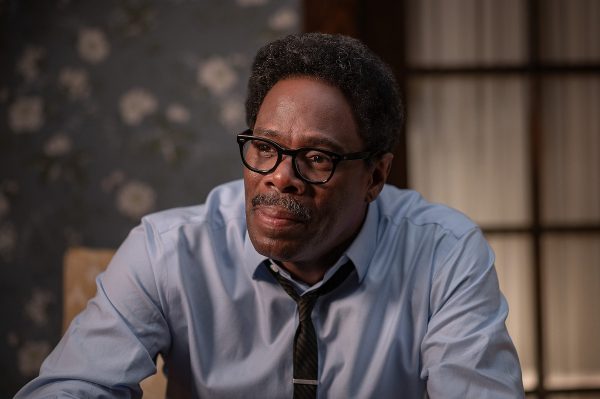
With plans for the Los Angeles march called off, King and Rustin parted ways. Rustin took a job in which he maintained a low profile while he assessed what his next step would be. He kept in contact with his activist peers, but he was less involved than he had been previously. But, as plans for a proposed 1963 March on Washington were heating up, Rustin was approached to play a key role in organizing the event, largely with the backing of labor union and civil rights activists A. Philip Randolph (Glynn Turman) and Ella Baker (Audra McDonald). And, when Rustin and King reached an agreement to reconcile their differences, they managed to make peace with one another and recommit to the alliance they had so successfully forged years earlier.
Inspired by the potential for the march and with significant pieces of the puzzle in place, Rustin decided to get behind the effort. But, once committed, he again ran into opposition from community leaders like Powell and NAACP Executive Director Roy Wilkins (Chris Rock), citing the aforementioned reservations about the propriety of Rustin’s appointment. However, with the firm backing of staunch allies like Randolph, labor organizer Cleve Robinson (Michael Potts), activist/writer/educator Dr. Anna Hedgeman (CCH Pounder) and Student Nonviolence Coordinating Committee (SNCC) Chairman John Lewis (Maxwell Whittington-Cooper), Rustin was given the mandate to coordinate plans for the event. But the downside in this was that he was operating on a tight time frame – eight weeks – with a long list of fundraising and logistical considerations to address, and some wondered whether he would be able to meet the deadline and the demands being placed on him.
Rustin’s enthusiasm and charisma proved to be infectious. Not only did he garner the support, assistance and cooperation of the movement’s notables, but he also won over a team of dedicated, hard-working volunteers, like 22-year-old Rachelle Horowitz (Lilli Kay), who coordinated transportation for thousands of marchers traveling to the nation’s capital. Like him, the volunteers believed in the cause and put in long hours to make sure the march would come off as hoped for. And, when they saw Rustin’s diligence at work in solving issues related to safety, security, first aid, the supply of basic necessities, and recruiting marchers from far and wide, they doubled their efforts to pull everything together.
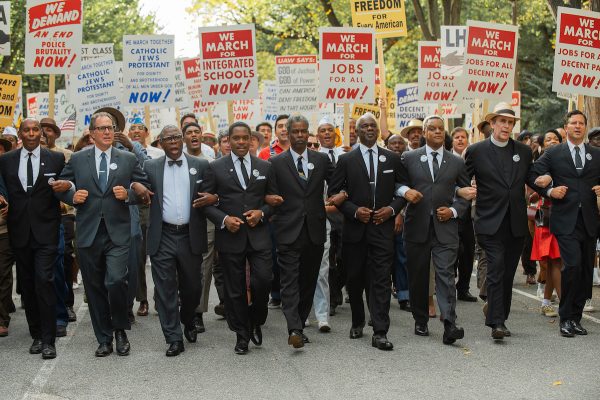
As events played out, though, there were incidents that threatened to derail Rustin’s efforts. For example, he became embroiled in a somewhat less-than-discreet affair with a young, married, sexually curious minister, Elias Taylor (Johnny Ramey), a composite fictional character based on several of Rustin’s romantic partners at the time. It was a relationship that, if exposed, could blow the top off of his efforts. The affair also placed strain on Rustin’s on-again/off-again involvement with his roommate, Tom Kahn (Gus Halper), one his most trusted aides and occasional bed mates. There were also strong public criticisms from politicians like Sen. Strom Thurmond (D-SC; later R-SC), who openly denounced Rustin for his homosexuality, onetime-Communist leanings and conscientious objector status. What’s more, as Rustin’s organizing success began to snowball, he again faced opposition from Powell, who took an almost-perverse glee in wanting to see him fail, especially now that Rustin was beginning to draw attention away from the influential Congressman. But Powell’s scheming and skepticism soon placed him in the minority when it came to his view of Rustin; he and other detractors soon became marginalized when they saw how much the activist had accomplished in such a short time.
With things in place as much as they were going to be, the time came in August 1963 when the event was to take place. For all of his hard work, though, Rustin still couldn’t help but wonder whether the march was going to succeed, observing on the day of the event that he “hope[d] people would show up.” Those fears proved unfounded, however. While he and his peers had hoped that the march would draw 100,000 participants, it ended up attracting approximately 250,000, making it the largest peaceful demonstration ever to be held on the Washington Mall. It featured appearances by such noteworthy performers as vocalist Mahalia Jackson (Da’Vine Joy Randolph), and it became famous as the event that showcased King’s now-famous “I have a dream” speech.
Not a bad outcome for someone who was reviled for speaking his mind, being himself and making the world aware that it was indeed time for a change.
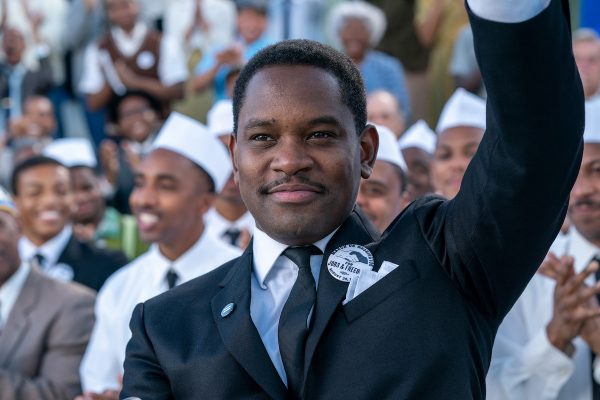
From how Rustin is portrayed in the film, it’s obvious he believed in the ideas behind the equal rights, civil rights and gay rights movements. They were part of who he was, and he naturally wanted to see them implemented for everyone in the wider world. His enthusiasm, faith in the process and hope for the future were visible to all, and he made no efforts to conceal these feelings and beliefs, no matter how unpopular they may have been in some quarters, including, ironically, among those who themselves would have benefitted most from their acceptance and implementation. His fervor was compelling, and others who agreed with his perspective couldn’t help but be impelled to follow suit and take action because of it.
Rustin’s belief in his determination was too strong to be denied. Even when he was attacked and criticized by the likes of Powell and Wilkins and experienced his falling out with King, he recoiled, coming back stronger than ever after taking time to regroup, alter his beliefs and rework his strategies. That willingness to reinvent himself when necessary carried the day and enabled him to step forward and fulfill his objectives. And those objectives were indeed crucial to his being, for they represented the destiny he was meant to live out, a practice in conscious creation terms often known as exercising his value fulfillment.
Rustin’s achievements were indeed significant in many endeavors, including in those not addressed in the film. He played an active role in the Freedom Riders movement and would later go on to be a vocal advocate in the gay rights movement. Even though this picture focuses primarily on one aspect of his accomplishments, it nevertheless gives viewers a clear look at who he was, what he believed and the kinds of accomplishments that came to characterize him, attainments that, in the end, we should all be grateful for.
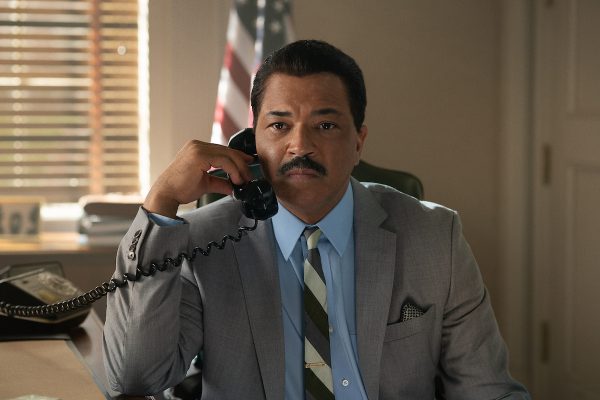
Unsung heroes often don’t get their day. Fortunately, however, for Rustin, he finally gets his due in this new biopic. The flamboyant, outspoken activist shines in this feature from director George C. Wolfe, showing Rustin as the determined champion that he was. The film presents an informative period piece biography, even if the approach is somewhat conventional and, admittedly, gets off to a rather rocky start in the first half hour. However, that’s made up for by a strong second half and the picture’s powerhouse cast, including Domingo (a strong Oscar nominee contender), Wright, Ameen, Turman, Pounder and Ramey in fine supporting performances. While this offering may not be everything it could have been, “Rustin” nevertheless reminds us of what so many people fought so hard to achieve – and why it’s so important that we strive to protect those accomplishments against backsliding and those who might seek to undermine the fulfillment of those much-cherished attainments. The film is available for streaming as a Netflix exclusive.
At times when things seem bleak, it’s all the more important that we have committed leaders who can step up, take charge and rally supporters to their causes, especially when so much is on the line. Lethargy, ambivalence and disinterest get us nowhere in the face of such issues, which is why the kind of uplifting enthusiasm generated by someone like Rustin is so important to furthering these initiatives. In an age where it’s become all too easy to step back, watch and remain uninvolved, it’s become crucial that we have films like this to ignite the flames of activism to address the injustices that remain and are allowed to continue unabated. Bayard would undoubtedly have been pleased with what’s become of his efforts – and be the first one to stand up and tell us we need to get back to work to finish the job.
Copyright © 2023, by Brent Marchant. All rights reserved.



